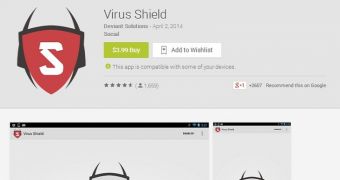All of the major security companies have mobile antivirus solutions in their offering. The list includes AVG, Bitdefender, Avast, ESET, Emsisoft, Malwarebytes, Comodo, Sophos, Dr. Web, and Kaspersky. So why would anyone install a security application from a company they know nothing about?
Google has recently removed Virus Shield from Google Play. The company took down the application after the folks from Android Police determined that it was fake.
Experts found that the app, which cost close to $4 (€2.9), did absolutely nothing to protect users’ Android devices against malware and other threats. Yet, it was downloaded over 10,000 times and it had a 4.7-star rating from over 1,600 users.
In just over a week, Virus Shield, developer by Deviant Solutions, became the number one new paid app. According to its description, the “security solution” prevents harmful apps from being installed on the device and protects personal information. It offers real-time protection, low battery usage, and, best of all, no ads.
In reality, the app doesn’t do anything. When its icon is tapped, it appears like it’s scanning the device for threats, but it doesn’t have any real security capabilities. Experts believe that fake reviews were posted to boost the phony app’s reputation.
This incident brings up two important questions. The first is: how did an app that looks suspicious right from the start make its way onto Google Play?
It’s well known that Google is having a hard time keeping Google Play clean. However, some serious questions are raised about Google’s vetting processes if a bogus app can become a best seller in just a week.
The second question is: why would users install something like Virus Shield when there are so many solutions (including free ones) provided by reputable companies?
Was it because of the reviews? Or the cool-looking interface? It’s worth noting that this isn’t a free app, so it’s unlikely that users have installed it just to see what it looks like and how it works.
One possible explanation is that many Android users are still not aware of the fact that not all applications hosted on Google Play can be trusted. It’s not uncommon for third-party markets to be riddled with scammy apps, but as experts have often demonstrated, fake or malicious software can make its way to Google Play as well.
Avast has recently surveyed thousands of smartphone users and learned that 34% of them don’t have any type of security solution installed on their devices. This shows that many people still don’t see their mobile phones as miniature computers that could become infected with malware just as their desktop computers.
Security companies have started putting more and more effort into promoting the importance of protecting mobile devices, but it appears that a lot more awareness raising is needed.
The bottom line is that if you do decide to install a security solution on your mobile phone, which you should, stick to the solutions of reputable companies.
Whether you choose the free or the premium versions of the apps, you can rest assured that a product in which a lot of resources have been invested is far better than an app that just emerged over night, no matter how good the reviews are on Google Play.

 14 DAY TRIAL //
14 DAY TRIAL //